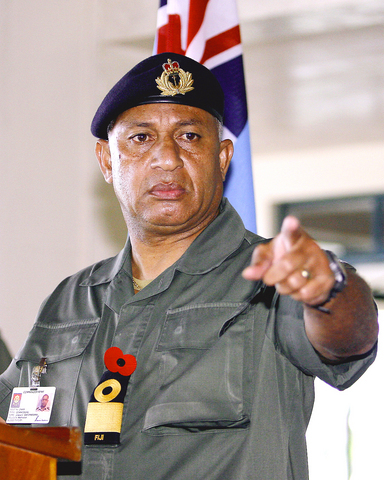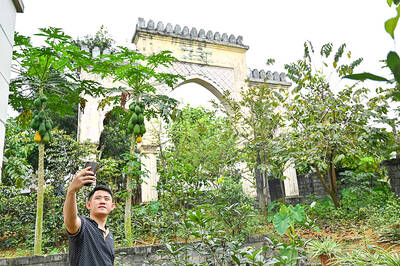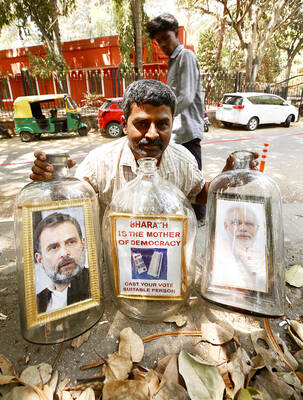Foreign ministers from 16 Pacific countries will hold a crisis meeting in Sydney this week in a last-ditch bid to avert Fiji's fourth coup in two decades, officials said yesterday.
The news came as troops started patrols around the Fijian capital Suva in what the military described as exercises, and Fiji's police commissioner described the country as "dangerously close" to a coup.
New Zealand's Foreign Minister Winston Peters held a second meeting in Wellington with Fiji's rebellious military commander, Commodore Voreqe Bainimarama, who has mobilized reservists after repeatedly threatening to overthrow Fiji's government.

PHOTO: AFP
Australia's Foreign Minister Alexander Downer -- who will host the foreign ministers' meeting in Sydney -- warned a coup was likely within two weeks.
"We are doing everything we possibly can to stop Commodore Bainimarama moving ahead with his coup in Fiji, but there is no doubt that he is somewhat committed to this course of action," he told parliament in Canberra.
Pacific Islands Forum Secretary-General Greg Urwin said Fiji's Prime Minister Laisenia Qarase had requested the ministers' meeting, which will be held on Friday.
Under the forum's Biketawa Declaration, member countries can intervene to help resolve unrest in another member state, but only at the request of the affected government.
"Any unlawful overthrow of a democratically elected government has wide implications for the entire region," Urwin said.
Fiji's government indicated it would welcome a statement from forum countries warning Fiji's military about the severe consequences of any illegal action, he said.
Australia and New Zealand on Sunday both elevated their warnings to their citizens planning to visit the country.
Fiji Police Commissioner Andrew Hughes, who has previously dismissed coup talk as rhetoric, said the country was dangerously close to a coup and added there was little chance of a negotiated settlement with Bainimarama.
"He has thumbed his nose at just about every element of society here, he's thumbed his nose at the diplomatic community, his overseas counterparts, it's mind-boggling," Hughes told Radio New Zealand.
Bainimarama has been in New Zealand on a private visit and met Peters on Saturday and again yesterday afternoon as regional powers scrambled to avert a coup.
"The government's message has consistently been that the military has no role in the processes of a democratically elected government," a spokesman for Peters said, declining to give details of the meetings.
The military raised the stakes on Sunday, announcing that around 1,000 reservists had been recalled to prepare for a "clean up" campaign against the government.
Military patrols in vehicles and on foot were seen on the streets of Suva yesterday, setting off rumors of an imminent takeover. But senior military officers said troops were only on exercise.
Bainimarama said over the weekend the army would act if Qarase did not drop a police investigation against him and other senior officers.
Qarase appealed for calm and said the government would not interfere with the police investigation into Bainimarama.
"The government will not be a party to breaking the law," he said.
Meanwhile, former coup leader and prime minister Sitiveni Rabuka pleaded not guilty yesterday to two counts of inciting a mutiny at the start of a new trial in Fiji's High Court.
High Court judge, Justice Gerard Winter, who last week ruled a mistrial in the original hearing, oversaw the swearing in of a fresh panel of five assessors, or jurors.
In his opening statement, prosecutor Mark Tedeschi said the two counts of inciting to mutiny were allegedly committed on or about July 4 and Nov. 2, 2000.
In the Nov. 2 mutiny in the Queen Elizabeth Barracks, eight soldiers were killed in a failed attempt by rebel troops to take over the barracks. Tedeschi said Rabuka was seen at the barracks on the day of the mutiny.

Le Tuan Binh keeps his Moroccan soldier father’s tombstone at his village home north of Hanoi, a treasured reminder of a man whose community in Vietnam has been largely forgotten. Mzid Ben Ali, or “Mohammed” as Binh calls him, was one of tens of thousands of North Africans who served in the French army as it battled to maintain its colonial rule of Indochina. He fought for France against the Viet Minh independence movement in the 1950s, before leaving the military — as either a defector or a captive — and making a life for himself in Vietnam. “It’s very emotional for me,”

The Chinese Communist Party’s (CCP) Central Committee is to gather in July for a key meeting known as a plenum, the third since the body of elite decisionmakers was elected in 2022, focusing on reforms amid “challenges” at home and complexities broad. Plenums are important events on China’s political calendar that require the attendance of all of the Central Committee, comprising 205 members and 171 alternate members with Chinese President Xi Jinping (習近平) at the helm. The Central Committee typically holds seven plenums between party congresses, which are held once every five years. The current central committee members were elected at the

Indian Prime Minister Narendra Modi reaffirmed his pledge to replace India’s religion-based marriage and inheritance laws with a uniform civil code if he returns to office for a third term, a move that some minority groups have opposed. In an interview with the Times of India listing his agenda, Modi said his government would push for making the code a reality. “It is clear that separate laws for communities are detrimental to the health of society,” he said in the interview published yesterday. “We cannot be a nation where one community is progressing with the support of the Constitution while the other

CODIFYING DISCRIMINATION: Transgender people would be sentenced to three years in prison, while same-sex relations could land a person in jail for more than a decade Iraq’s parliament on Saturday passed a bill criminalizing same-sex relations, which would receive a sentence of up to 15 years in prison, in a move rights groups condemned as an “attack on human rights.” Transgender people would be sentenced to three years’ jail under the amendments to a 1988 anti-prostitution law, which were adopted during a session attended by 170 of 329 lawmakers. A previous draft had proposed capital punishment for same-sex relations, in what campaigners had called a “dangerous” escalation. The new amendments enable courts to sentence people engaging in same-sex relations to 10 to 15 years in prison, according to the